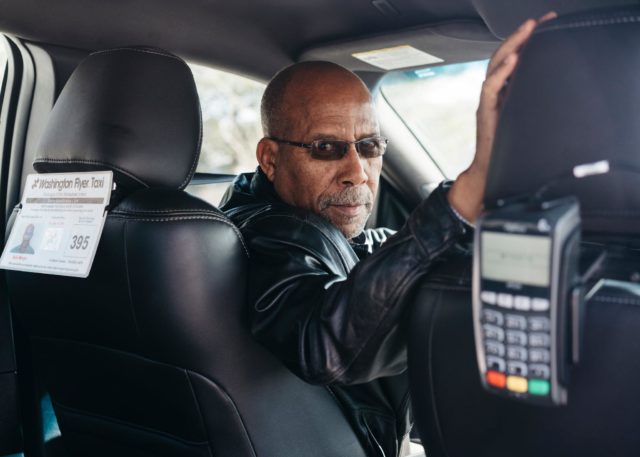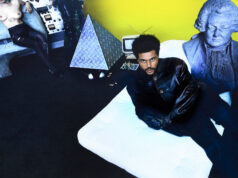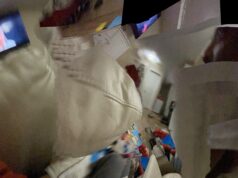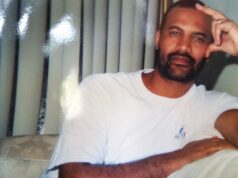By Giovanni Russonello
Feb. 20, 2018
FORT WASHINGTON, MD. — When Hailu Mergia releases his album “Lala Belu” on Friday, it will be this Ethiopian piano luminary’s first collection of new music in two decades. And it will be his first ever aimed largely at a worldwide audience.
Until recently, Mr. Mergia, 71, was hardly known outside of his home country, where he is seen as a musical pioneer. For most of the past 20 years, he has lived in the Washington area and driven a taxi, picking up passengers at Dulles Airport and toting an electric keyboard in his trunk. He still drives the cab for extra cash. In idle moments, he hauls out the keyboard and sits alone in the back seat, his eyes closed, improvising.
Mr. Mergia had long given up performing publicly when the 2013 reissue of “Hailu Mergia and His Classical Instrument,” a mostly forgotten gem from 1985, turned him into a cult celebrity among music obsessives across the globe, and set him off on tours of the United States and Europe. He has kept up a consistent schedule of international performances ever since.
On a recent Saturday, Mr. Mergia sat in an easy chair at his home here, describing how he relates to the audience he’s garnered in the past few years. “The idea of ‘Lala Belu’ is, it’s a composition you can sing with everybody,” he said, referring to the new album’s title track. “It’s simple. No Amharic lyrics, no English lyrics. Just ‘lala.’ Whenever we have a show, we just play that song, and everybody’s singing with us.”
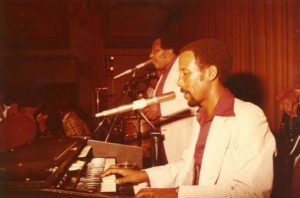 In the 1960s and ’70s, Mr. Mergia, foreground, led the Walias Band, which gave Ethiopian music a more electrified sound. The group held a residency at the Hilton for approximately 10 years.
In the 1960s and ’70s, Mr. Mergia, foreground, led the Walias Band, which gave Ethiopian music a more electrified sound. The group held a residency at the Hilton for approximately 10 years.
In Ethiopia, Mr. Mergia’s music has never been forgotten. In the 1960s and ’70s he led the Walias Band, one of the country’s best-known groups and a guiding force in Addis Ababa’s freshly invigorated music scene. The Walias Band welded the slanted minor modes and hovering grooves of Ethiopian music onto a wriggling, electrified sound. In it you could hear the funk of the Meters, the Afro-Latin rock of Santana, the Afrobeat blowing over from Nigeria and Ghana.
The band graduated from Addis Ababa nightclubs to a coveted residency at the city’s Hilton, which it held for roughly 10 years. In 1977 it recorded “Tche Belew,” an album that became an Ethiopian classic. But the band broke up in the early 1980s, at the end of its only international tour, and Mr. Mergia settled in the Washington area, home to the world’s largest expatriate Ethiopian community. As the years went on, gigs became scarcer, and in 1991 he stopped playing music professionally altogether.
But a few years ago, Brian Shimkovitz, who runs the small independent label Awesome Tapes From Africa, came across “Hailu Mergia and His Classical Instrument,” a woozy, synth-laden love letter to Mr. Mergia’s favorite old melodies from back home. (The “classical instrument” is the accordion, which carries the tunes over a bed of drum machines and sinewy electronics.) Mr. Shimkovitz knew immediately he wanted to reissue the album, which was long out of print.
Awesome Tapes is also behind the coming release of “Lala Belu,” a six-track LP featuring Ethiopian traditionals and Mergia originals. This is the first album Mr. Mergia has recorded with all non-Ethiopian accompanists (the bassist Mike Majkowski and the drummer Tony Buck are from Australia), but it’s not a hard departure from the approach he and the Walias Band established in the 1960s and ’70s.













